This page is continuously updated, so please check back soon for more information about upcoming presentations. Links to past years’ events and our YouTube channel are available at the bottom of the page. For consistent notification of the latest news and events, sign up for our mailing list.
Most of our events are held at our center in Amman (click here for directions). If located elsewhere, this will be stated clearly in the announcement. If you missed a lecture, most are also posted on our YouTube channel a few days after.
updated 27 January 2026
2026 SPRING LECTURE SERIES
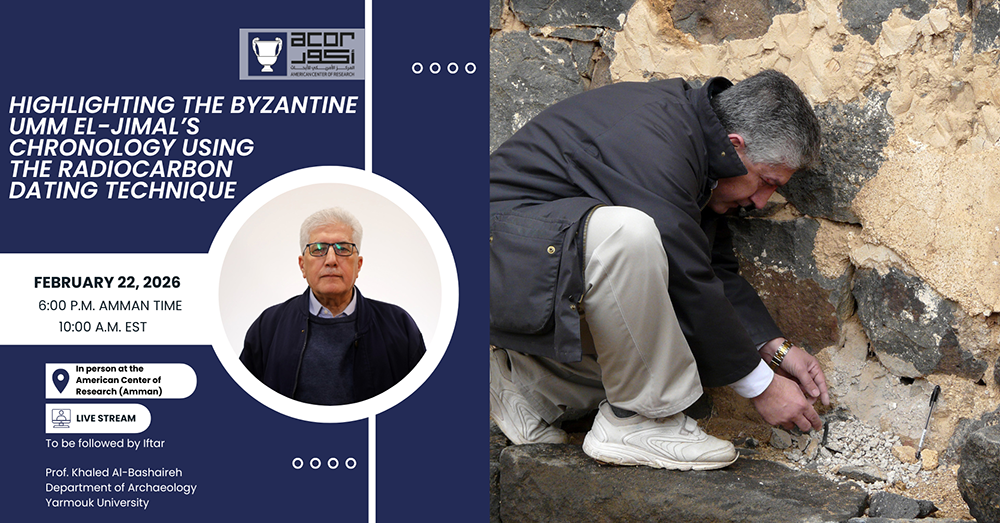
“Highlighting the Byzantine Umm el-Jimal’s Chronology Using the Radiocarbon Dating Technique”
By Prof. Khaled Al-Bashaireh
Date: February 22, 2025
Time: 6:00 p.m. Amman Time/10 a.m. EST
Place: American Center of Research, Amman (click for directions)
Attend in person or remotely:
Zoom: https://us02web.zoom.us/j/85783320394?pwd=ibi9oTzlykJCjc43xISj8XeuwZ9YH6.1
Webinar ID: 857 8332 0394
Passcode: 626066
YouTube Livestream: https://www.youtube.com/@ACORJordan1968/streams
About the Lecture
The archaeological site of Umm el-Jimal has long drawn the attention of explorers and archaeologists. It attests to about 800 years of continuous occupation, which started in Nabataean times and lasted until the early Muslim period. The site is located in the northeastern area of Jordan, close to Bostra, and belonged to its bishopric. It is distinguished by its large number of churches, which were identified during the surveys, research, and excavations conducted at the site in the past decades. The churches have been dated to the Byzantine period on the basis of their architectural elements and stylistic comparisons to other churches in the region and/or in some cases, their latest ceramics in sealed layers, such as floors. Only two of the churches, the Julianos Church and the Cathedral, were dated by inscriptions not found in situ within them. Bert de Vries dated the North East Church to ca. AD 490 and the Numerianos Church to a later year, and he argued that most of the churches of Umm el-Jimal were probably built during the prosperous late Byzantine period, as were the many churches of the neighboring sites of Khirbet es-Samra, Rihab, and Bostra, among others.
One of the interesting features of the churches is the in situ presence of original cement materials (plaster and mortar) that were used to fill the gaps between stone rows, to cover the internal facades of the walls and apses, and to build mosaics and floors. The cement materials have inclusions of charcoal, straw, and seeds.
The lecture, which will be presented in English, focuses on the use of the 14C technique in dating these organic materials to determine the age of churches of unknown date, to reconstruct their chronological sequence within the chronology of the Byzantine period of the site, and to understand the history of the Byzantine cultural development and religious buildings.
The presentation will be followed by a Q&A session and Iftar.
About the Speaker
Khaled Al-Bashaireh is a professor of archaeometry in the Department of Archaeology of Yarmouk University, where he serves as the dean of the Faculty of Archaeology and Anthropology. He earned his PhD in archaeological science from the University of Arizona. His research focuses on the scientific analysis of ancient materials, specifically using radiocarbon dating (accelerator mass spectrometry) to determine the chronology of monumental structures. He is also a leading expert in the provenance of ancient white and colored marbles across Roman and Byzantine sites in the Levant, in addition to his interest in other topics, including ancient technology, diet, environment, and archaeoseismology.
Prof. Al-Bashaireh was honored (among others) with the General Union of Arab Archaeologists Award for Scientific Merit in 2019 and the prestigious Abdul Hameed Shoman Award for Arab Researchers in 2022 for his outstanding scientific contributions to the humanities. The latter award, one of the most significant in the Arab world, recognized his innovative use of archaeometric techniques to resolve complex historical debates. With over 60 peer-reviewed publications in high-impact journals, he continues to bridge the gap between traditional archaeology and advanced material science, mentoring new generations of researchers in Jordan.

“Amman’s Modern/Adaptive Reuse and Internention within Historic Settings as Earned Privilege”
By Prof. Dr. Rami Daher
Date: January 12, 2025
Time: 6:00 p.m. Amman Time/10 a.m. EST
Place: American Center of Research, Amman (click for directions)
Watch the video on our YouTube channel
About the Lecture
In his lecture, Prof. Rami Daher grants a voice to modern heritage in Amman and in the Arab World. Focusing on Amman, he will demonstrate how different levels of the understanding of place (physical, discursive, typological, and phenomenological) can inform interventions within historic settings. The lecture will present key projects of adaptive reuse and other forms of interventions within historic settings mostly from Amman, demonstrating indulgence in the understanding of place and exploring the potentials of adaptive reuse of modern heritage in Amman and the Arab World. The lecture will end with a focus on the current world preoccupation with modern heritage and its transformations servicing society and its collective memory.
A Q&A session will follow the presentation.
About the Speaker
Dr. Rami Daher is a professor at the School of Architecture and Built Environment at the German Jordanian University (GJU) and a practicing architect and general director at Turath for Studies and Design. He taught at the American University of Beirut’s Department of Architecture and Design, at Texas A&M’s College of Architecture, and at Jordan University of Science and Technology (where he held the position of department head between 2003 and 2006). Daher earned a bachelor of architecture from the University of Jordan (1988), a master of architecture from the University of Minnesota (1991), and a PhD in architecture from Texas A&M (1995), and he was a recipient of a Fulbright Scholarship through which he did his postdoctoral studies at the University of California, Berkeley (2001). At Turath, Daher led several key projects on urban regeneration and public space design, heritage conservation and management, adaptive reuse of heritage sites, development of intervention guidelines for heritage sites and areas, preparation of conservation management plans, nomination of sites to the World Heritage List, urban planning, and others in Amman and in the region.
Prof. Daher is also the recipient of the prestigious Abdelhamid Shouman Arab Researchers Award for its 35th cycle in the category of Engineering Sciences/Conservation and Restoration of Historic Buildings. He is also the recipient of the Arab Architects Award (2018) in the “Rehabilitation” category for the adaptive reuse of Amman’s historic Electricity Company Hangar project. Furthermore, Prof. Daher is the recipient of the Arab Architects Award (2022) in the “Tourism and Entertainment” category for the design of the Shomari Wildlife Reserve Visitor Center.
2025 FALL LECTURE SERIES
September 29: “Urban and Economic Activities in the Hinterland of Petra” by H.E. Dr. Fawzi Abudanah
ancho
The Inaugural Professor Thomas W. Davis Annual Lecture
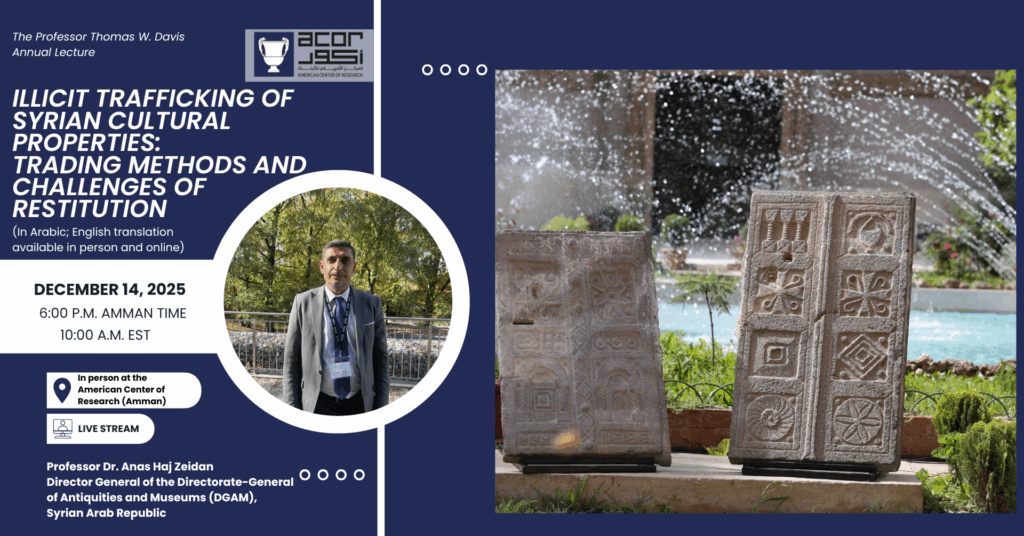
“Illicit Trafficking of Syrian Cultural Properties: Trading Methods and Challenges of Restitution”
By Prof. Dr. Anas Haj Zeidan
Date: December 14, 2025
Time: 6:00 p.m. Amman Time/10 a.m. EST
Place: American Center of Research, Amman (click for directions)
Watch the video on our YouTube channel (in Arabic)
Watch the video on our YouTube channel (in English)
About the Lecture
ACOR is honored to announce the inaugural Professor Thomas W. Davis Annual Lecture:
Prof. Dr. Anas Haj Zeidan, director general of the Directorate-General of Antiquities and Museums (DGAM) of the Syrian Arab Republic, will present “Illicit Trafficking of Syrian Cultural Properties: Trading Methods and Challenges of Restitution.” In addition to addressing the role of the DGAM in documentation processes for cultural properties, this lecture will cover penalties for trafficking under the current Syrian Antiquities Law, the status of antiquities outside Syria, and the roles of Customs and the Ministry of Interior in the protection of cultural property.
Prof. Dr. Zeidan will give his lecture in Arabic. Live translation into English will be available for both in-person and online attendees. The presentation will be followed by a Q&A session.
About the Speaker
Prof. Dr. Anas Haj Zeidan earned his master’s degree in the conservation of antiquities from the University of Florence and his PhD in Near Eastern archaeology from the Sapienza University of Rome. His research interests, which he presents in academic publications and media appearances, focus on the protection of Syrian cultural heritage, particularly in conflict-affected areas. He lectures at several Syrian universities and has made notable contributions to archaeological missions and scholarly publications related to cultural heritage preservation, as well as to nomination projects of Syrian sites for inclusion in the UNESCO World Heritage List. Formerly the head of the Idlib Antiquities Department, he now serves as director general of the Syrian Arab Republic’s Directorate-General of Antiquities and Museums (DGAM).
About the Professor Thomas W. Davis Annual Lecture
In honor of trustee, scholar, and long-time supporter of ACOR Tom Davis, in 2025 the ACOR Board of Trustees created the “Professor Thomas W. Davis Lecture.” The most prestigious lecture of our annual series, these lectures generally focus on the “interconnections” aspect of ACOR’s mission. Prof. Thomas W. Davis (1956–2025) was a prominent scholar of the eastern Mediterranean and western Asia. Professor Davis served on ACOR’s board of trustees (2020–2025) and as chair of the Publications Committee during our most prolific publishing era. To read more about this lecture series, please visit its webpage.
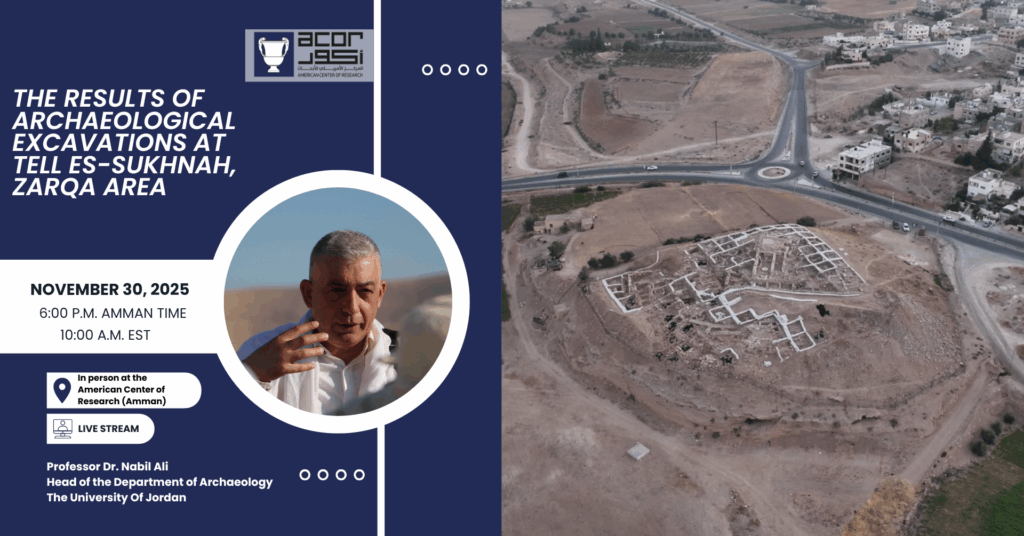
“The Results of Archaeological Excavations at Tell Es-Sukhnah, Zarqa Area”
By Prof. Dr. Nabil Ali
Date: November 30, 2025
Time: 6:00 p.m. Amman Time; 10 a.m. EST
Place: American Center of Research, Amman (click for directions)
Watch the video on our YouTube channel
About the Lecture
The archaeological site of Tell Es-Sukhnah is located in the northeastern part of Jordan, in the middle/upper area of the Wadi az-Zarqa basin. Excavations at the site have uncovered different human occupations spanning from the Middle Bronze Age to the Islamic period. In this lecture, the focus will be on the results of excavations with respect to human settlements at the site during the Middle Bronze Age, Iron Age, and Hellenistic period. Furthermore, it will shed light on functional changes of the site during those periods and on its role at the regional scale, especially regarding its location along the west-east trade routes and as part of the Ammonite territories during the Iron Ages.
The presentation will be followed by a Q&A session.
About the Speaker
Prof. Dr. Nabil Ali is the head of the Department of Archaeology at the University of Jordan. Dr. Ali holds a Ph.D. from the Albert-Ludwigs-Universität Freiburg in Germany (2003), where he completed his dissertation, “The Development of Pottery Technology from the Late Sixth to the Fifth Millennium BC in Northern Jordan: Ethno- and Archaeological Studies (Abu Hamid as a Key Site),” under the supervision of Prof. Dr. M. Heinz in the Department of Near Eastern Archaeology.
His research focuses on ancient Near Eastern archaeology, with particular interest in ethnoarchaeology, archaeological method and theory, the emergence of social complexity, and postcolonial approaches to the past. Prof. Dr. Ali’s work integrates ethnographic and archaeological data to explore technological traditions and cultural developments in prehistoric Jordan.
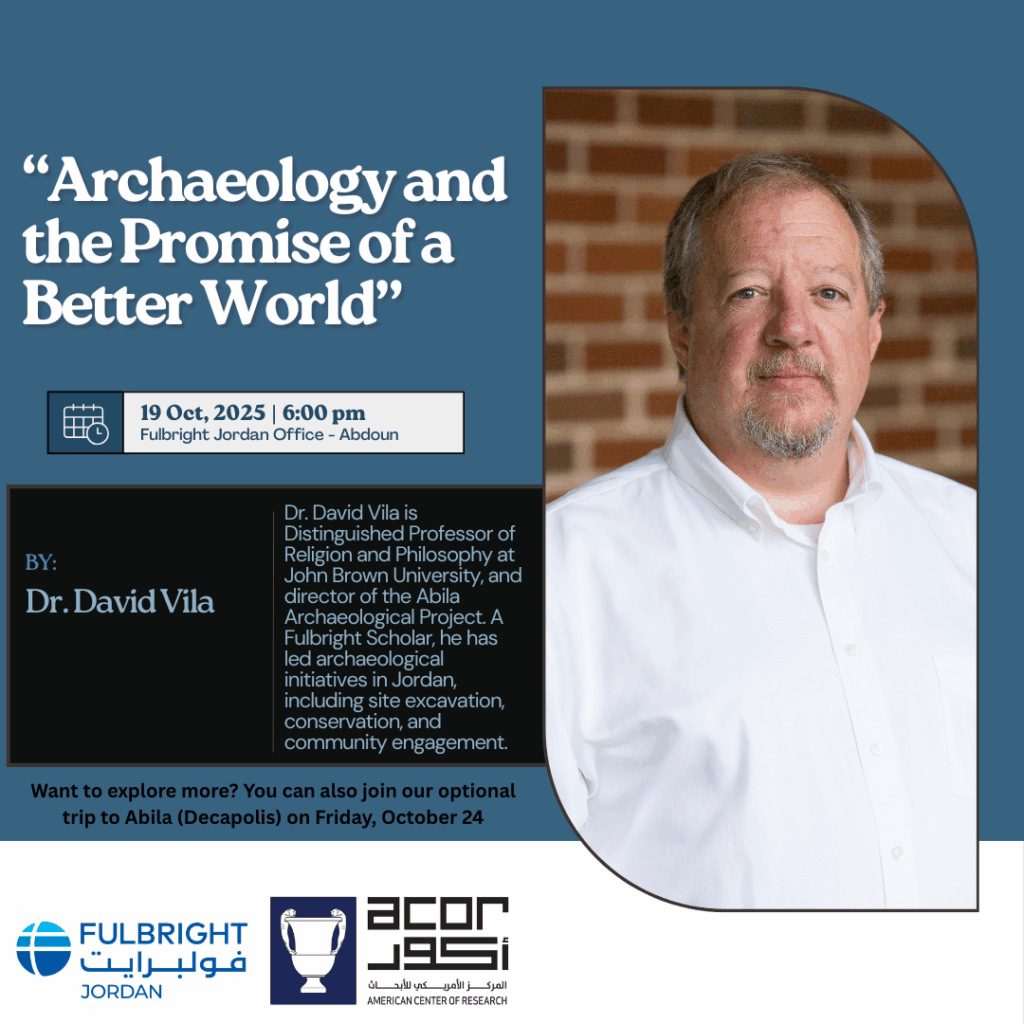
“Archaeology and the Promise of a Better World”
By Dr. David Vila
PLEASE NOTE THAT PREREGISTRATION IS REQUIRED TO ATTEND THIS EVENT IN PERSON: https://forms.office.com/r/yjkzJ9AR0Q
Date: October 19, 2025
Time: 6:00 p.m. Amman Time; 11 a.m. EDT
Place: Fulbright Jordan Office, Abdoun (Amman) (click for map)
Watch the video on our YouTube channel
About the Lecture
Archaeology has a role to play in our world that goes far beyond the excavation, conservation, and restoration of ancient ruins and artifacts. Both the connections that are made between excavation teams and the local communities around archaeological sites, as well as the lessons learned from the civilizations under excavation, can yield profound insights that are immediately relevant to our modern world. In this presentation, we will consider how various facets of the work of an archaeological excavation can lay the groundwork for the promise of a better world for all of us.
The presentation will be followed by a Q&A session.
Please note the location of the lecture, which will be held at the Fulbright Jordan Office, Abdoun, Amman.
In addition, Fulbright Jordan is organizing a guided trip to Abila on Friday, October 24, 2025, led by Dr. Vila. The tour participation fee of 25 JOD will cover the tour and round-trip transportation from the Fulbright Office, as well as lunch. The fee can be paid on the day of the lecture. To sign up for the lecture or the trip, please fill out the form provided at this link: https://forms.office.com/r/yjkzJ9AR0Q
About the Speaker
David Vila is Distinguished Professor of Religion and Philosophy at John Brown University in Siloam Springs, Arkansas, USA, where he has taught since 1999. Since 2025, he has held the Abila Chair in the Archaeology and History of the Biblical World, and in that capacity directs the University’s Abila Archaeological Project, Jordan Summer Studies Program, Abila Lectures, and other archaeological initiatives. Dr. Vila spent the 2006–2007 academic year as a Fulbright Scholar affiliated with the University of Jordan. During the 2025–2026 academic year he returns to Jordan again through the Fulbright Scholar program and is affiliated with Yarmouk University. His research project includes collaboration with the Department of Antiquities, creating plans for tourism development for Abila of the Decapolis, as well as mapping out five- and ten-year plans for the excavation, conservation, and restoration of the archaeological site of Abila of the Decapolis.
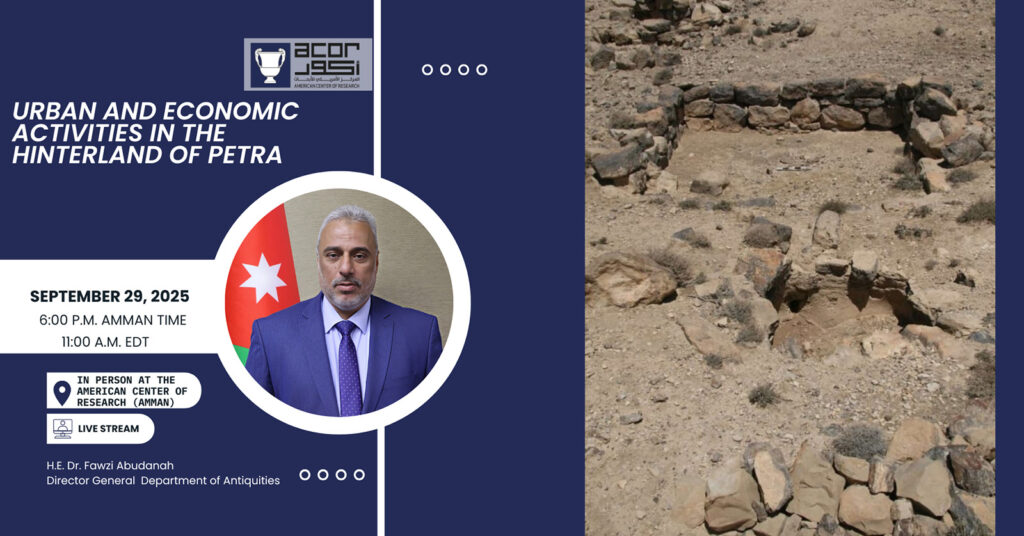
“Urban and Economic Activities in the Hinterland of Petra”
By H.E. Dr. Fawzi Abudanah
Date: September 29, 2025
Time: 6:00 p.m. Amman Time; 11 a.m. EDT
Place: American Center of Research, Amman (click for directions)
Watch the video on our YouTube channel
About the Lecture
The lecture is a summary of the archaeological evidence that H.E. Dr. Fawzi Abudanah has collected from the hinterland of Petra since 2003. The fieldwork projects, which he directed or co-directed, revealed important information regarding urban and economic activities. The volume and distribution of the latter are very significant and reflect long-term urbanization. The lecture will cover road networks, water installations, wine presses, settlements, and tombs.
The presentation will be followed by a Q&A session.
About the Speaker
H.E. Dr. Fawzi Abudanah is a scholar of classical and Near Eastern archaeology with a strong academic background in Roman and Nabataean studies. He earned a PhD in Roman archaeology (2006) and an MA in Greek and Roman archaeology (2003) from the School of Historical Studies at the University of Newcastle upon Tyne, England. Earlier, he completed a BA in archaeology and tourism at Mu’tah University in 1997. Through this academic training, Dr. Abu Dannah developed expertise in Roman provincial archaeology, the archaeology of Petra and southern Jordan, and the cultural interactions of the ancient Mediterranean and Near Eastern worlds. This foundation has shaped his subsequent teaching, research, and contributions to archaeological scholarship and heritage preservation in Jordan and beyond.
2025 SPRING LECTURE SERIES
June 11: Special Lecture Presented in Partnership with the Embassy of the Czech Republic in Amman: “The Royal Pyramid Necropolis in Abusir (Egypt)” by Jaromír Krejčí
May 6: “Alois Musil’s Explorations of Southern Jordan in 1896–1902” by Robert Schick
March 3: “Remembering Khalil Gibran: An Unparalleled Guide for Our Times” by Paul G. Chandler
February 25: “Umm Al-Jimal: Jordan’s Newest UNESCO World Heritage Site” by Darrell Rohl
February 2: “The Iron Age Townscape of Busayra” by Benjamin Porter
January 14: “Captivating Strangers: Early Arab Immigrants in the United States” by Linda K. Jacobs
Special Lecture Presented in Partnership with the Embassy of the Czech Republic in Amman

“The Royal Pyramid Necropolis in Abusir (Egypt)”
By Jaromír Krejčí
Date: June 11, 2025
Time: 6:30 p.m. Amman Time
Place: American Center of Research, Amman (click for directions)
Please note that this lecture will not be available remotely.
About the Lecture
The royal pyramid necropolis at Abusir Center is one of the most significant archaeological sites in the region of ancient Egypt’s capital, Memphis, which was founded around 3100 BC at the dawn of the unified Egyptian state. The necropolis flourished during the Fifth Dynasty (c. 2435–2306 BC), when the pyramid complexes of four Egyptian kings were constructed. Surrounding these monumental structures were the pyramids of queens, tombs of royal family members, and burials of non-royals. Since 1960, the Czech Institute of Egyptology, Faculty of Arts, Charles University, has been conducting research at this site. Over the decades, it has uncovered dozens of archaeological artifacts in Abusir, most of which date back to the third millennium BC, primarily from the Old Kingdom (2686–2181 BC). The era in which the pyramid complexes at Abusir Center were built was marked by advancements in technological knowledge, increasing complexity in the administration of the Egyptian state, and administrative reforms. It also saw changes in the concept of kingship, evolving religious ideas, and distinct architectural styles. Notably, this period was characterized by the rise of the sun cult, whose growing influence is evident in religious imagery, royal titulary, the design of pyramid complexes, and the construction of specific religious precincts known as sun temples. Of the six solar temples mentioned in written sources of the period, two have been archaeologically investigated—the sun temples of Kings Userkaf and Niuserre, located northwest of Abusir Center. These temples were closely associated with the mortuary cult practices within the pyramid complexes. Accordingly, the lecture will provide a brief overview of these temples alongside the monuments at Abusir Center.
About the Speaker
Doc. Mgr. Jaromír Krejčí, PhD, is a staff member of the Czech Institute of Egyptology at the Faculty of Arts, Charles University in Prague, is an Egyptologist with long-standing archaeological experience in Egypt. He specializes in addressing issues of Egyptian archaeology and history from the end of the Fourth to the mid-Second Millennium BC. Additionally, he involved in the study of development of ancient Egyptian architecture. He has been regularly participating in archaeological research in Egypt since 1991, focusing mainly on the study of structures at the Fifth Dynasty royal cemetery in Central Abusir. Recently, he has been engaged in the archaeological excavation in the eastern part of the pyramid complex of King Niuserre and the study of the solar cult and its manifestations in Egypt in the Third Millennium BC. Alongside this, he has been actively involved in teaching students at his home institution for a long time, he supervises student works and regularly gives lectures for the public and appears in the media.

“Desert Kites and the Timing of Prehistoric Hunting Landscapes in Jordan”
By Sahar Al Khasawneh
Date: May 26, 2025
Time: 6:00 p.m. Amman Time (11:00 a.m. EDT)
Place: American Center of Research, Amman (click for directions)
Watch the video on our YouTube channel
About the Lecture
Desert kites are among the most enigmatic prehistoric structures in Jordan’s arid landscapes, forming vast hunting traps designed to capture wild gazelles and other game. Despite their abundance, the timing of their construction and use has long been debated due to the scarcity of direct dating evidence. Research employing innovative dating techniques has determined the age of a kite in Jordan, providing the first precise chronology for these ancient hunting landscapes.
The presentation will be followed by a Q&A session.
About the Speaker
Dr. Sahar al Khasawneh is an associate professor in the Department of Conservation and Management of Cultural Resources, Yarmouk University, Jordan, and a researcher specializing in nuclear physics, luminescence dating, geoarchaeology, and climate change. Her expertise lies in the application of radiometric and luminescence dating techniques to cultural heritage and archaeological research. At Yarmouk University, she leads research in the field of geoarchaeology and radiometric dating.
She has coordinated several international projects, including those under the International Atomic Energy Agency (IAEA), aimed at advancing nuclear techniques for the preservation of cultural heritage. She has received significant grants for her research, including for projects on luminescence rock surface dating in Jordan and the development of radiometric chronologies for megalithic structures. Her peer-reviewed work has been published in high-impact journals, and she regularly contributes to international conferences on luminescence, archaeology, and geoarchaeology.
Dr. al Khasawneh has undertaken several research visits globally, collaborating with institutions in Poland, Germany, Cyprus, and Italy, among others. Her published research includes studies on luminescence dating of Neolithic and Iron Age sites in Jordan, as well as new methods for understanding ancient landscapes and human activity. She is dedicated to advancing the scientific understanding of cultural heritage through innovative applications of nuclear science and technology.

“Alois Musil’s Explorations of Southern Jordan in 1896–1902”
by Robert Schick
May 6, 2025
6:00 p.m. Amman Time (11:00 a.m. EDT)
Location: American Center of Research, Amman (click for directions)
The lecture may also be attended remotely:
Zoom:
https://us02web.zoom.us/j/84656482394?pwd=2xnYViPvlrWxZeyVdqgegHSHdRJuRd.1
Webinar ID: 846 5648 2394 | Passcode 752987
YouTube livestream:
https://www.youtube.com/@ACORJordan1968
Alois Musil (1864–1944) was a Czech explorer who travelled extensively in the Middle East from 1895 to 1917, including southern Jordan and the Negev between 1896 and 1902, just after the Ottomans reestablished government control of the region in 1894. He was the first explorer to travel systematically in southern Jordan and record archaeological sites and geographical features. He is best known for his discovery of Quseir ‘Amra in 1898.
He published the results of his travels in southern Jordan and the Negev in three volumes titled Arabia Petraea in 1907-1908. Because those volumes were written in German, they have been neglected, especially his ethnographic travel report. He immersed himself more deeply into the local culture than other explorers and he documented the first extensive corpus of Arabic poetry and music in Jordan.
The presentation will be followed by a Q&A session.
About the Speaker:
Dr. Robert Schick is an independent scholar who has devoted the bulk of his academic career to the history and archaeology of Jordan in the Late Roman to Islamic periods, with a focus on southern Jordan, with a second interest in the Islamic sites and monuments of Jerusalem. He received his PhD from the University of Chicago in 1987 with a study on the Christian communities in Palestine from Byzantine to Islamic rule, and he has participated in numerous seasons of excavations in Jordan since 1980. He is a freelance translator of scholarly literature from German and Arabic into English, including the eight German volumes by Gustaf Dalman about Palestinian folk customs written a hundred years ago. He taught archaeology courses at the Palestinian al-Quds University and Bir Zeit University between 1995 and 1998, and he taught Islamic Studies in Hyderabad, India, from 2000 to 2006. He was based at the University of Mainz from 2014 to 2019.

“The Nabataeans’ Innovative Techniques: Water System, Pottery, and Quarries”
by Yazan Safwan Al-Tell
April 8, 2025
6:00 p.m. Amman Time (11:00 a.m. EST)
Location: American Center of Research, Amman (click for directions)
Watch the video on our YouTube channel
The science of interpretation, heritage, and archaeology plays a crucial role in a country such as Jordan, which boasts a rich tapestry of archaeological sites, among them Petra, Jerash, and the Dead Sea. These disciplines help uncover and preserve the stories of ancient civilizations, enabling a deeper understanding of Jordan’s cultural and historical legacy. Interpretation makes archaeological findings accessible to both experts and the general public, transforming static sites into immersive narratives that highlight their historical, social, and technological significance. This fosters a sense of national pride and identity, as Jordanians connect with their ancestors’ achievements and contributions to human civilization.
Moreover, heritage and archaeology have significant economic and social impacts in Jordan. Tourism driven by archaeological sites is a major contributor to the country’s economy, attracting millions of visitors annually. Proper interpretation and preservation ensure that these sites remain sustainable attractions, while also safeguarding their authenticity. Additionally, these sciences promote international collaboration, research, and funding opportunities, elevating Jordan’s global cultural standing. On a local level, they provide educational and employment opportunities, raising awareness about the importance of heritage conservation and empowering communities to actively participate in protecting their shared history.
The presentation will be followed by a Q&A session.
About the Speaker:
Dr. Yazan Safwan Al-Tell is an assistant professor at the University of Jordan’s Faculty of Archaeology and Tourism, specializing in cultural resource management. He earned his PhD in archaeology, cultural resource management, and conservation from the Brandenburg University of Technology in Germany, with a dissertation focusing on the interpretation and presentation of Nabataean innovative technologies, particularly in Petra, Jordan. His research interests include Nabataean heritage, cultural resource management, and the preservation of archaeological sites. He has published works on topics such as the looting of antiquities in Jordan and the detection of hazardous gases in museums using advanced materials.
In addition to his academic pursuits, Dr. Al-Tell has been involved in various initiatives to promote cultural heritage awareness. For instance, he accompanied 16 undergraduate students from the University of Jordan to the American Center of Research to celebrate International Archives Week. Dr. Al-Tell is also active on social media platforms, sharing insights related to his field

“Remembering Khalil Gibran: An Unparalleled Guide for Our Times”
by Paul G. Chandler
March 3, 2025
6:00 p.m. Amman Time (10:00 a.m. EST)
Location: American Center of Research, Amman (click for directions)
Watch the video on our YouTube channel
Drawing from his most recent book, In Search of a Prophet: A Spiritual Journey with Kahlil Gibran (Bloomsbury/Rowman & Littlefield), Paul G. Chandler will take the listener on a fascinating journey through the all-embracing nature of Kahlil Gibran, the early-20th century Lebanese-born poet-artist, author of the bestselling book _The Prophet_. Chandler will explore how Kahlil Gibran, a supreme East-West figure, is an unparalleled guide in the midst of today’s global challenges, related to peace, harmony, and the building of bridges between diverse cultures, ethnicities, and spiritual traditions.
About the Speaker:
Paul G. Chandler is an author, art curator, speaker, NGO executive, interreligious peacemaker, and intercultural bridgebuilder. He grew up in Senegal, West Africa, and has lived and worked extensively around the world in senior leadership roles within publishing, the arts, relief and development, and the Anglican Communion. He is the founding president of CARAVAN Arts, an international NGO that uses the arts for transformational purposes. He is recognized as a global leader in using the arts to build bridges, toward fostering peace, harmony, and wholeness in our world. He has organized and curated major art exhibitions internationally — in sacred spaces such as St. Paul’s Cathedral in London and the National Cathedral in Washington, D.C., and at notable art venues such as the National Gallery of Fine Arts in Amman, Sotheby’s in London, the American University Museum in Washington, D.C., the Vanderbilt University Fine Arts Gallery, and the Museum of Modern Art in Cairo, as well as at reverential memorial sites, including Ground Zero in New York.

“Umm Al-Jimal: Jordan’s Newest UNESCO World Heritage Site”
by Darrell Rohl
February 25, 2025
6:00 p.m. Amman Time (10:00 a.m. EST)
Location: American Center of Research, Amman (click for directions)
Watch the video on our YouTube channel
This lecture will explore the archaeological site of Umm Al-Jimal, inscribed as Jordan’s seventh UNESCO World Heritage Site in July 2024. The presentation will provide a comprehensive overview of the site’s “outstanding universal value,” making it accessible to both newcomers and those already familiar with Umm Al-Jimal. Attendees will gain insights into the site’s ancient structures and artifacts, which contribute to its unique historical significance.
The lecture will also highlight the enduring partnership among the Calvin University Umm Al-Jimal Archaeological Project, the Department of Antiquities of Jordan, and the local community at Umm Al-Jimal. Initiated by the late Professor Bert de Vries in 1972, this collaboration has fostered innovation in field research, community engagement, heritage management, and site promotion. Current efforts focus on completing a backlog of major publications, digitizing over 50 years of research and fieldwork data for an open-access digital archive, generating high-precision three-dimensional documentation of the site’s ancient structures, and continuing to work for the flourishing of both the site and the local community. The lecture will conclude with a summary of future plans.
About the Speaker:
Darrell Rohl is an associate professor of archaeology and history at Calvin University and a co-director of the Umm Al-Jimal Archaeological Project. Currently residing in Jordan as a Fulbright U.S. Scholar affiliated with Al Al-Bayt University, Dr. Rohl is focusing on the digital documentation of Umm Al-Jimal. This project involves developing a new database using the Arches data platform and integrating terrestrial 3-D LiDAR scans with detailed architectural drawings and field data collected over the past five decades.

“The Iron Age Townscape of Busayra”
by Benjamin Porter
February 2, 2025
6:00 p.m. Amman Time (10:00 a.m. EST)
Watch the video on our YouTube channel
This talk draws together past and recent research on the Iron Age townscape of Busayra, widely believed to be the administrative capital of the kingdom of Edom. Excavations during the 1970s revealed a suite of monumental public architecture and residential neighborhoods on the settlement’s summit. Recent research carried out by the speaker and his colleagues have returned to these partially documented buildings to better understand their role in the settlement and in the broader region. Geophysical research in unexcavated areas have determined that these were part of a larger townscape awaiting further study. This talk will describe these new discoveries as well as discuss opportunities to continue site development and community engagement activities in the future.
About the Speaker:
Benjamin W. Porter is an associate professor of Middle Eastern archaeology in the University of California, Berkeley’s Department of Middle Eastern Languages and Cultures. An archaeologist and anthropologist, Porter investigates the Bronze and Iron Age societies of the ancient Levant. He has carried out archaeological excavations at Dhiban and Busayra in Jordan. His research has been supported by the National Science Foundation, the National Endowment for the Humanities, the American Philosophical Society, and the Max Van Berchem Foundation, among others.
ONLINE LECTURE
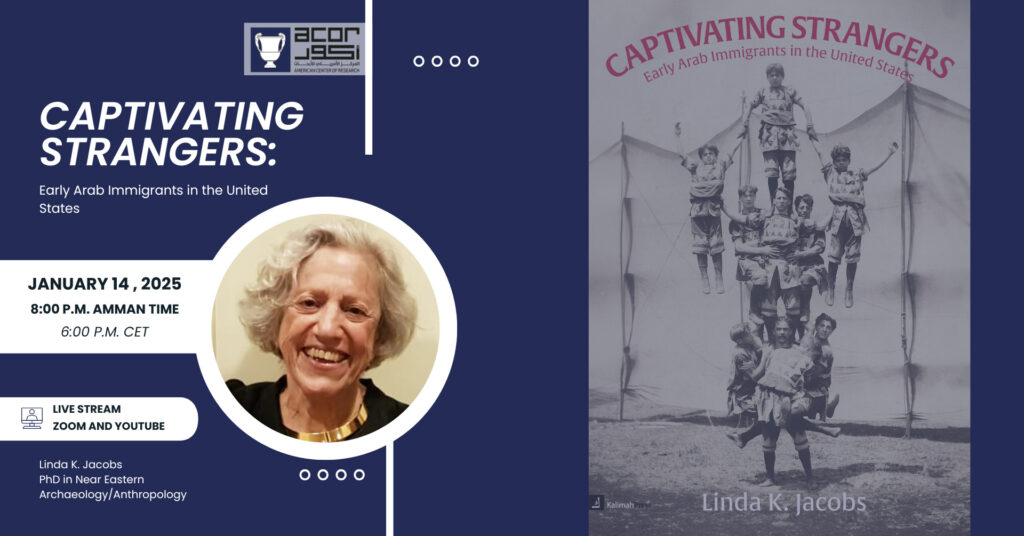
“Captivating Strangers: Early Arab Immigrants in the United States”
by Linda K. Jacobs
Please note that this lecture was online only.
January 14, 2025
8:00 p.m. Amman Time (12:00 noon EST)
Watch the video on our YouTube channel
On January 14, 2025, please join us online for a lecture by Linda K. Jacobs, author of the new book Captivating Strangers: Early Arab Immigrants in the United States. In her latest work, Jacobs explores the untold stories of the first Arab immigrants to the United States. From North African acrobats who performed before the Civil War to western-educated doctors, merchants, and entrepreneurs who spread across the country in the 20th century, the book highlights the incredible variety of careers and contributions these individuals made to American society. Through rich narratives, Captivating Strangers uncovers how these early immigrants navigated challenges, built communities, and left a lasting legacy, shaping the cultural tapestry of the United States.
About the Speaker:
Linda K. Jacobs has a PhD in Near Eastern archaeology/anthropology and spent many years working on excavations and economic development projects in the region. She serves on the board of several regional NGOs. A recognized authority on the early Arab diaspora in the United States, she is the author of Captivating Strangers: Early Arab Immigrants in the United States (2024), Strangers in the West: The Syrian Colony of New York City, 1880–1900 (2015; 2nd Edition, 2023), and Strangers No More: Syrians in the United States, 1880–1900 (2019). An archaeological memoir, Digging In: An American Archaeologist Uncovers the Real Iran, appeared in 2012. All four of her grandparents were members of the 19th-century New York Syrian/Lebanese Colony.
Linda K. Jacobs is not only a passionate historian but also a generous supporter of cultural preservation. She has donated a significant collection of photographs of Syria and Jordan to our digital archive.
Events of Past Years
Online lectures on demand
Did you know ACOR has dozens of recordings of past academic presentations, available for free on our YouTube channel? Click here to see our video list, including short presentations from virtual academic conferences (e.g., ASOR and MESA) as well as feature lecture events previously held at ACOR in recent years.




